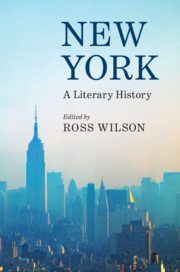Book contents
- New York: A Literary History
- New York
- Copyright page
- Contents
- Contributors
- Acknowledgements
- Chapter 1 Introduction
- Part I Adaptation and Adjustment
- Part II Innovation and Inspiration
- Part III Identity and Place
- Part IV Tragedy and Hope
- Chapter 15 The Spatial Drama of Hope and Desire in Contemporary New York City Literature
- Chapter 16 New and Old Amsterdam in Twenty-First Century Fiction
- Chapter 17 Beats, Black Culture and Bohemianism in Mid-Twentieth-Century New York City
- Chapter 18 ‘The Sixth Borough’
- Chapter 19 Walking the City
- Chapter 20 Afterword
- Bibliography
- Index
Chapter 20 - Afterword
from Part IV - Tragedy and Hope
Published online by Cambridge University Press: 19 February 2020
- New York: A Literary History
- New York
- Copyright page
- Contents
- Contributors
- Acknowledgements
- Chapter 1 Introduction
- Part I Adaptation and Adjustment
- Part II Innovation and Inspiration
- Part III Identity and Place
- Part IV Tragedy and Hope
- Chapter 15 The Spatial Drama of Hope and Desire in Contemporary New York City Literature
- Chapter 16 New and Old Amsterdam in Twenty-First Century Fiction
- Chapter 17 Beats, Black Culture and Bohemianism in Mid-Twentieth-Century New York City
- Chapter 18 ‘The Sixth Borough’
- Chapter 19 Walking the City
- Chapter 20 Afterword
- Bibliography
- Index
Summary
The afterword explores how the essays in this collection elucidate the relationship of New York to the literary written page. They describe a complex range of subjects and interrogate the relationship between the printed page and life in one of the greatest cities on earth by looking at genre, characters, ethnicity, race, locality, and much more. This is a complicated city, with dozens of foreign languages spoken and read daily, and people of seemingly clashing cultures living side by side in peace. For a long time, New York dominated the American publishing scene, and was headquarters for scores of successful book publishers, hundreds of widely#x2013;circulated magazines and newspapers, and thousands of poetry and prose books, reinforcing its place as the commercial and literary capital of the nation. The fiction that locals wrote, and the fiction that locals read, defined the way New Yorkers thought about that complexity of life in the port city.
Keywords
- Type
- Chapter
- Information
- New YorkA Literary History, pp. 285 - 295Publisher: Cambridge University PressPrint publication year: 2020



